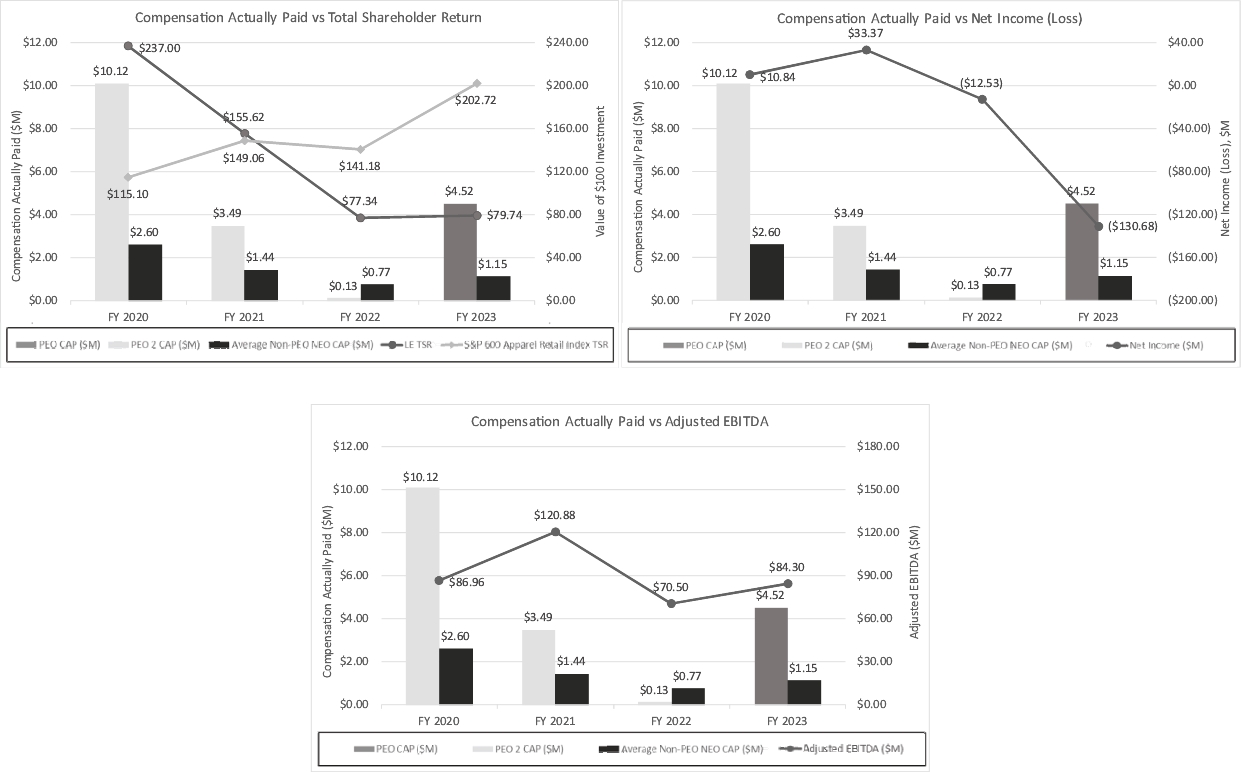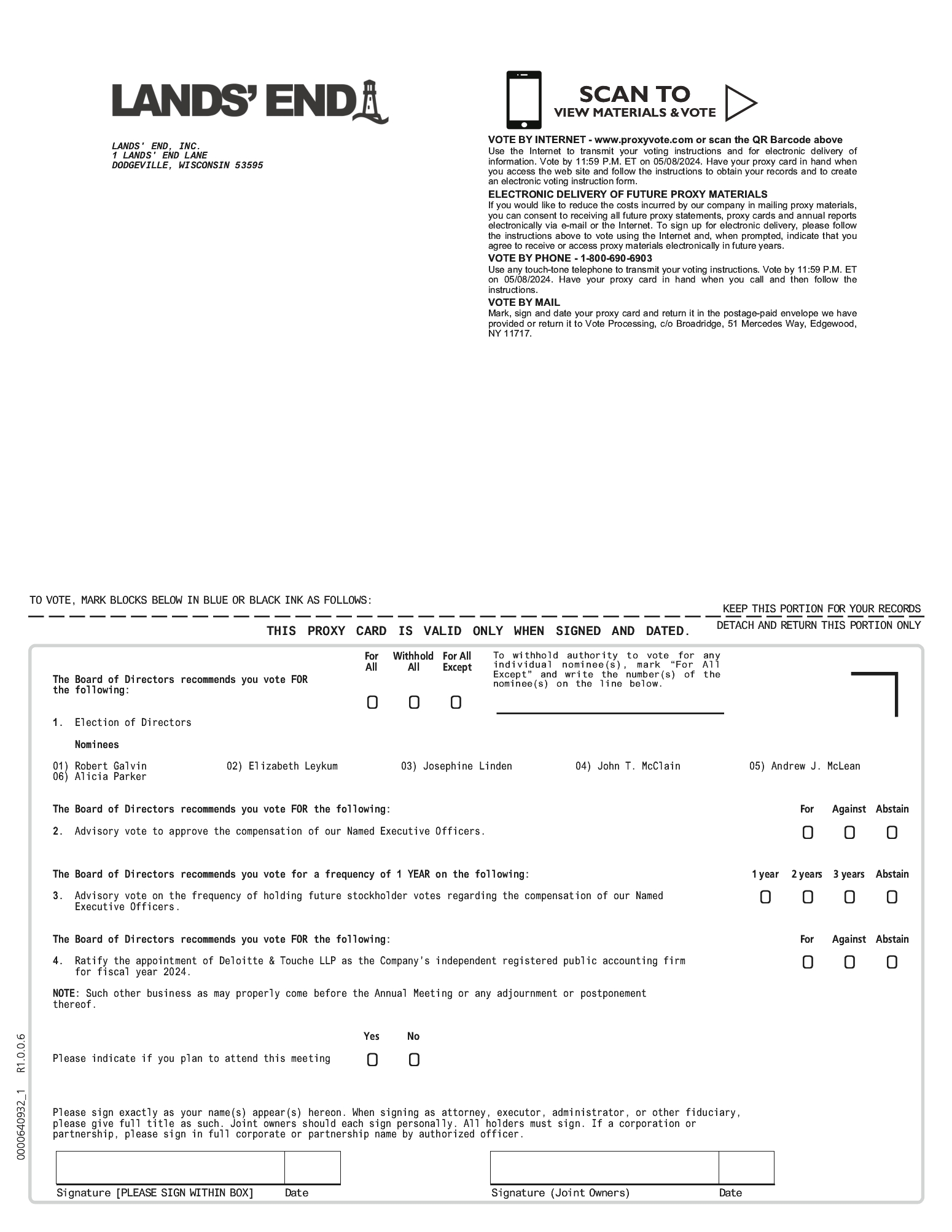ITEM 1. ELECTION OF DIRECTORS
Item 1 is the election of six nominees to our Board: Robert Galvin, Elizabeth Leykum, Josephine Linden, John T. McClain, Andrew J. McLean and Alicia Parker. Alicia Parker is being nominated for the first time, and each of the other nominees is a current member of the Board. If elected, each nominee will hold office until the next annual meeting or until their successor is elected and qualified, or earlier death, resignation, disqualification or removal. The Board currently has seven members: Robert Galvin, Elizabeth Leykum, Josephine Linden, John T. McClain, Andrew J. McLean, who are standing for reelection, as well as Jignesh Patel and Jonah Staw, who are not standing for reelection. By resolution of the Board in accordance with the Company’s Bylaws, effective upon the 2024 Annual Meeting, the size of the Board will be reduced to six members. We wish to thank Jignesh Patel and Jonah Staw, who have each served on the Board since 2014, for their many years of distinguished service on the Board and their dedication to the Company.
The persons named in the proxy card (the “proxies”) will vote FOR the election of all of the nominees listed below, unless otherwise instructed. You may not vote for a greater number of persons than the number of nominees named in this Proxy Statement. The Board expects all nominees to be available for election. If any nominee should become unavailable to serve as a director for any reason prior to the Annual Meeting, the Board may substitute another person as a nominee. In that case, your shares will be voted for that other person.
THE BOARD RECOMMENDS THAT YOU VOTE
“FOR” ELECTION OF THE SIX NOMINEES FOR DIRECTOR
The biographies of each of the nominees and members of the Board below contains information regarding the person’s service as a director, business experience, education, public company director positions held currently or at any time during the last five years, information regarding involvement in certain legal or administrative proceedings, if applicable, and the experiences, qualifications, attributes or skills that caused the Board to determine that the person should serve as a director for the Company.
New Nominee:
Alicia Parker, 47, has been nominated for election to the Board for the first time at the Annual Meeting. Since 2021 she has served as Chief Marketing Officer of Tishman Speyer, a leading international real estate owner, developer, operator and investment manager. Previously she served as Vice President, Brand & Consumer Marketing of Casper Sleep from 2020 to 2021, and as Director of Sales and Marketing of the Peninsula Hotels from 2017 to 2020. Prior to that she served as Senior Director, Marketing from 2013 to 2017, and Global Brand & Program Director from 2012 to 2013, for Ralph Lauren. She also served as Senior Vice President, Marketing and Business Strategy of Agenda from 2011 to 2012, and as Group Account Director of RDA from 2007 to 2011. She also worked in public relations from 2006 to 2007 at Warner Bros. Records and served as a Brand Marketing Consultant and Producer from 2004-2006. She served as Manager, Global Partner Network from 2001 to 2004, and Associate/Associate Manager from 1998 to 2000 for Strategic Management Group, Inc. Ms. Parker brings to the Board an extensive and dynamic understanding of marketing, brand development and sales, from both her in-house and agency experience in a variety of industries.
Nominees Currently Serving on the Board:
Robert Galvin, 64, joined the Board in May 2014. Since October 2018, he has served as President and Chief Executive Officer of Iconix International, formerly Iconix Brand Group, Inc., a leading brand management company, which Mr. Galvin also served as a member of the board of directors from October 2018 to August 2021. From January 2014 to October 2018, he was the principal of Galvin Consulting, which he founded in January 2014. Mr. Galvin served as the Chief Executive Officer of Elie Tahari, a leading global designer lifestyle brand, from January to November 2013. Prior to that, he served as the President of Camuto Group, a leading global women’s fashion footwear company from April 2007 to January 2012. Mr. Galvin previously served as the Chief Operating Officer of Sport Brands International, a global wholesale and retail athletic branded company from 2003 until April 2007. He previously held leadership roles at Kurt Salmon Associates, York International and Nine West Group Inc. Mr. Galvin served as a member of the board of directors of Big 5 Sporting Goods Corporation from July 2015 to October 2018, bebe stores, inc. from November 2014 to September 2018, Cherokee Inc. (now Apex Global Brands Inc.) from June 2012 to October 2018 and Trans World Entertainment Corporation from June 2018 to October 2018. Mr. Galvin has a B.S. in Accounting from











